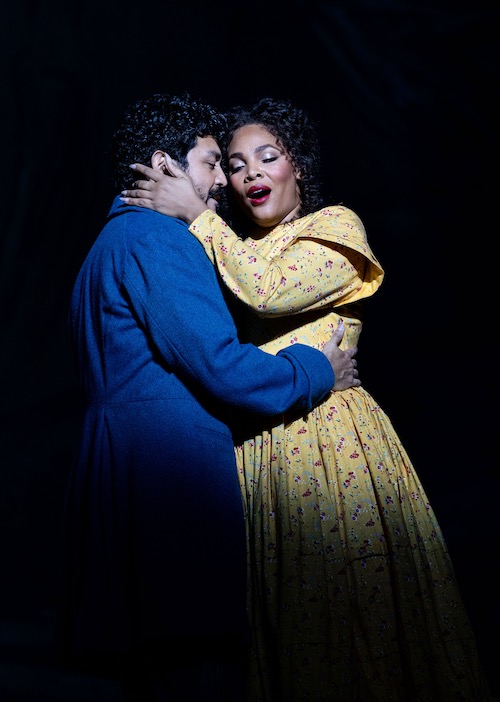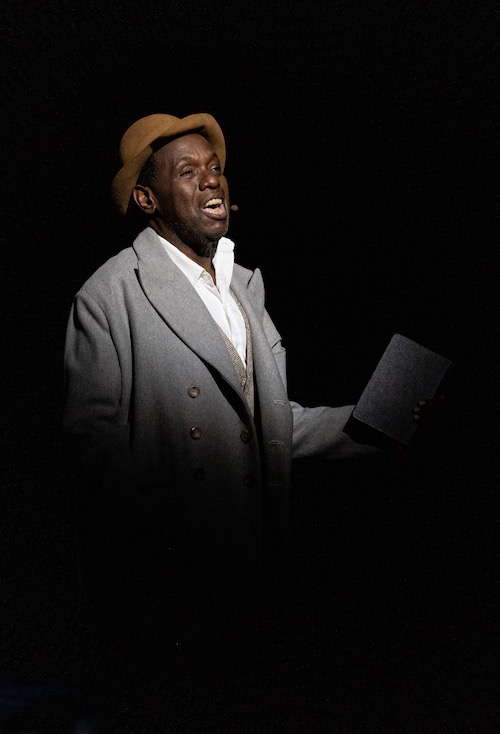BLO’s disastrous directorial conceits make for a backwards “Boheme” in more ways than one

Lauren Michelle and Jesus Garcia star in Boston Lyric Opera’s production of Puccini’s La bohème. Photo Olivia Moon
How does one turn a tragedy into a love story with a happy ending? That’s the conundrum at the heart of Yuval Sharon’s new production of Giacomo Puccini’s La bohème that opened Boston Lyric Opera’s season Friday night at the Emerson Colonial Theater.
It’s not, of course, a problem one finds in the original, in which a once-besotted couple, Rodolfo and Mimí, are separated at the end by her death.
Nor is Sharon’s the best way to attempt a refreshening of a canonic staple. Yet the Israeli director doesn’t just fiddle with the plot by taking Puccini’s description of the piece as “four pictures” as dubious license to toy with its chronology. Presumably to avoid confusion, he adds a superfluous character, “The Wanderer,” to narrate and provide commentary on the inverted proceedings. Rarely is it a good sign when an opera director’s staging requires spoken assistance.
The point Sharon seems to be getting at is that momentous turns in life can hinge on seemingly trivial choices and that we should live our own lives intentionally in light of this fact. That’s all good and well, but it doesn’t require heavy-handed underlining in a staging. Or upending Bohème’s plot for that matter: often the spots he highlights are already clearly marked in both the libretto and the score.
Either way, the story of this La bohème runs: Mimí dies. She and Rodolfo make up. They and their friends have dinner at Café Momus. Rodolfo and Mimí meet.
Though billed as a novel staging, the tale-in-reverse concept is hardly new: F. Scott Fitzgerald utilized the grave-to-cradle motif in The Curious Case of Benjamin Button a century ago. More recently (and light-heartedly), the Seinfeld episode “The Betrayal” offered a backwards narrative that was as memorable for its inanities as for its sight gags.
Aside from some welcome slapstick in Act 2, we haven’t got any of the latter here. What’s more, reordering Bohème’s plot wreaks havoc on its two foundational elements: the libretto and the score.
As originally constructed, we come to know the main characters—the poet Rodolfo, seamstress Mimí, painter Marcello, philosopher Colline, and musician Schaunard, all through the exposition of Act 1. When you start with Act 4, the people are there, alright, but the audience has no emotional investment in any of them. Accordingly, the experience of sitting through this production is distanced and rather impersonal: it’s like looking through a photo montage after the funeral of your best friend’s grandmother instead of having lived life with her.
To mitigate the issue, The Wanderer (on Friday, realized by Marshall Hughes) guides us through the labyrinth of the backwards plot. But his oracular interjections become increasingly banal and pointless as the piece proceeds. “What if Mimí doesn’t turn around at the door?” he offers at a pivotal moment in Act 1. Hmm…maybe she dies alone in her garret and we don’t have to sit through any more of this silliness.
Musically, Puccini’s score—played with exceptional finesse and nuance by the BLO orchestra on Friday under David Angus—is a study in subtle complexity. Its contrasts of tone and character are developed over the course of its four acts, which is one reason why the sudden shift from the party music in Act 4 to the haunted reminiscences of Act 1, when Mimí, fatally ill, is brought in to Rodolfo’s apartment, is so potent.
Swapping out Act 1 for Act 4 is to jar, at least a bit, the opera’s carefully calibrated sense of musical flow, though Puccini does ultimately triumph over his latest re-interpreter. So devastating is his setting of Mimí’s death that, by placing it first, Sharon ensures that her demise casts a shadow over the rest of the night’s proceedings. Tragedy isn’t banished; rather, it hovers throughout.
All of this suggests, then, that Sharon’s inverted plot business is little more than a gimmick: a curious angle, yes, but one that fails to justify itself, which is precisely what so radical an approach demands.
Frustrating as the production proved, many of the musical aspects of Friday’s Bohème were satisfying.
As Mimí, Lauren Michelle sang with bewitching warmth and clarity of tone. It can be easy for this character to come off as a sentimental caricature, but Michelle’s account of her role was about as three-dimensional as could be hoped for.
Jesus Garcia sang Rodolfo with pleasing, even tone across his instrument and projected a winningly natural stage presence. His “Che gelida mamina” impressed, though throughout the night he often sounded underpowered, especially in ensemble numbers.
At his most extroverted, Edward Parks’ Marcello channeled a Thomas Hampton-esque tone (though one of his finest moments came in his character’s riotous physical response to Musetta’s Act 2 histrionics). Benjamin Taylor sang Schaunard robustly and William Guanbo Su was a sympathetic Colline.
Chelsea Basler’s Musetta never stole the spotlight from Michelle, but her “Quando me’n vo” was silken and her character’s insouciant back-and-forth with Marcello in Act 3 didn’t skimp on the vinegar.
In John Conklin’s set design, an off-set, rotating (and distractingly creaky) disc did triple duty as apartment, café, and toll gate. At times it was dizzying, and the hapless staging only offered more inconsistencies. This included miming props vs. actually holding them, handing off objects to figures who periodically emerged from and disappeared into the wings, plus a strangely ghoulish climax to Act 2 with a Christmas Eve procession of giant puppets, masks, and hand cutouts. Jessica Jahn’s period costumes and John Torres’ lighting design, though, were broadly traditional.
Angus presided over everything from the front of the stage. Surprisingly, the Colonial Theater offered no pit for the orchestra. Even so, in recent years the group’s rarely sounded better than they did on Friday, playing with real delicacy, spirit, and blend. Generally, the voices on stage had little difficulty projecting over the big ensemble. The contributions of the BLO Chorus and VOICES Boston were likewise vigorous and well-blended.
Ironically, the most faithful aspect of the staging was the natural, unstilted translation of its text and supertitles. As a result, La bohème’s characters and their motivations spoke with immediacy, despite the best efforts of director Sharon to undermine them and Puccini.
La bohème runs through October 2 at Emerson Colonial Theater. blo.org
Posted in Performances
